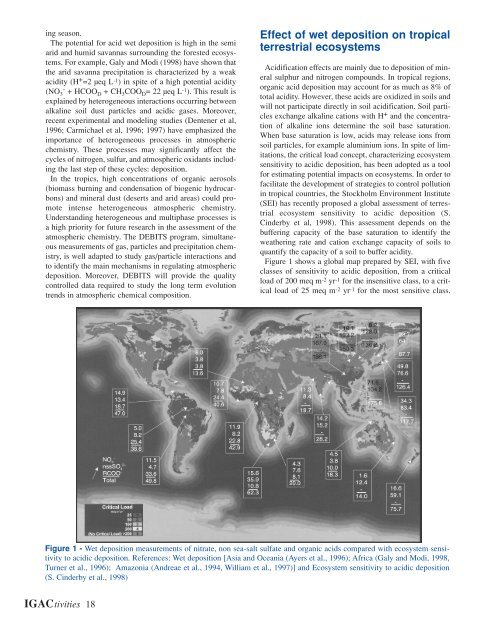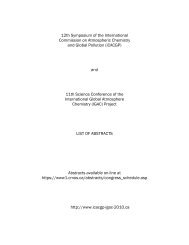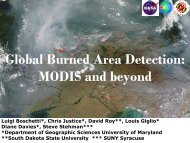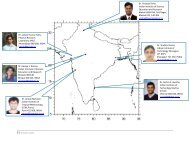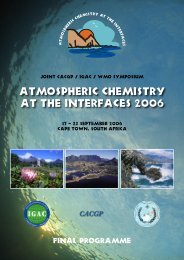Issue 27 Jan 2003 - IGAC Project
Issue 27 Jan 2003 - IGAC Project
Issue 27 Jan 2003 - IGAC Project
You also want an ePaper? Increase the reach of your titles
YUMPU automatically turns print PDFs into web optimized ePapers that Google loves.
ing season.<br />
The potential for acid wet deposition is high in the semi<br />
arid and humid savannas surrounding the forested ecosystems.<br />
For example, Galy and Modi (1998) have shown that<br />
the arid savanna precipitation is characterized by a weak<br />
acidity (H + =2 µeq L -1 ) in spite of a high potential acidity<br />
(NO 3 - + HCOO D + CH 3 COO D = 22 µeq L -1 ). This result is<br />
explained by heterogeneous interactions occurring between<br />
alkaline soil dust particles and acidic gases. Moreover,<br />
recent experimental and modeling studies (Dentener et al,<br />
1996; Carmichael et al, 1996; 1997) have emphasized the<br />
importance of heterogeneous processes in atmospheric<br />
chemistry. These processes may significantly affect the<br />
cycles of nitrogen, sulfur, and atmospheric oxidants including<br />
the last step of these cycles: deposition.<br />
In the tropics, high concentrations of organic aerosols<br />
(biomass burning and condensation of biogenic hydrocarbons)<br />
and mineral dust (deserts and arid areas) could promote<br />
intense heterogeneous atmospheric chemistry.<br />
Understanding heterogeneous and multiphase processes is<br />
a high priority for future research in the assessment of the<br />
atmospheric chemistry. The DEBITS program, simultaneous<br />
measurements of gas, particles and precipitation chemistry,<br />
is well adapted to study gas/particle interactions and<br />
to identify the main mechanisms in regulating atmospheric<br />
deposition. Moreover, DEBITS will provide the quality<br />
controlled data required to study the long term evolution<br />
trends in atmospheric chemical composition.<br />
Effect of wet deposition on tropical<br />
terrestrial ecosystems<br />
Acidification effects are mainly due to deposition of mineral<br />
sulphur and nitrogen compounds. In tropical regions,<br />
organic acid deposition may account for as much as 8% of<br />
total acidity. However, these acids are oxidized in soils and<br />
will not participate directly in soil acidification. Soil particles<br />
exchange alkaline cations with H + and the concentration<br />
of alkaline ions determine the soil base saturation.<br />
When base saturation is low, acids may release ions from<br />
soil particles, for example aluminium ions. In spite of limitations,<br />
the critical load concept, characterizing ecosystem<br />
sensitivity to acidic deposition, has been adopted as a tool<br />
for estimating potential impacts on ecosystems. In order to<br />
facilitate the development of strategies to control pollution<br />
in tropical countries, the Stockholm Environment Institute<br />
(SEI) has recently proposed a global assessment of terrestrial<br />
ecosystem sensitivity to acidic deposition (S.<br />
Cinderby et al, 1998). This assessment depends on the<br />
buffering capacity of the base saturation to identify the<br />
weathering rate and cation exchange capacity of soils to<br />
quantify the capacity of a soil to buffer acidity.<br />
Figure 1 shows a global map prepared by SEI, with five<br />
classes of sensitivity to acidic deposition, from a critical<br />
load of 200 meq m -2 yr -1 for the insensitive class, to a critical<br />
load of 25 meq m -2 yr -1 for the most sensitive class.<br />
Figure 1 - Wet deposition measurements of nitrate, non sea-salt sulfate and organic acids compared with ecosystem sensitivity<br />
to acidic deposition. References: Wet deposition [Asia and Oceania (Ayers et al., 1996); Africa (Galy and Modi, 1998,<br />
Turner et al., 1996); Amazonia (Andreae et al., 1994, William et al., 1997)] and Ecosystem sensitivity to acidic deposition<br />
(S. Cinderby et al., 1998)<br />
<strong>IGAC</strong>tivities 18


